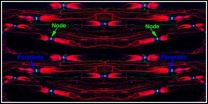(Press-News.org) COLUMBUS, Ohio -- Parents who share caregiving for their preschool children may experience more conflict than those in which the mother is the primary caregiver, according to a new study.
Results showed that couples had a stronger, more supportive co-parenting relationship when the father spent more time playing with their child. But when the father participated more in caregiving, like preparing meals for the child or giving baths, the couples were more likely to display less supportive and more undermining co-parenting behavior toward each other.
The results were surprising, and may be disappointing for people who believe mothers and fathers should share equally in the caregiving for their children, said Sarah Schoppe-Sullivan, co-author of the study and associate professor of human development and family science at Ohio State University.
But, she said, it shows that there is not just one way to share parenting duties.
"I don't think this means that for every family, a father being involved in caregiving is a bad thing. But it is not the recipe for all couples," Schoppe-Sullivan said.
"You can certainly have a solid co-parenting relationship without sharing caregiving responsibilities equally."
Schoppe-Sullivan conducted the study with Rongfang Jia, a graduate student at Ohio State. The study appears in the January 2011 issue of the journal Developmental Psychology.
The study was designed to test how a father's involvement in child caregiving affected the couple's co-parenting relationship -- how parents interact together while parenting their child.
The study began with 112 Midwestern couples, most of whom were married, who had a 4-year-old child. At the beginning of the study, fathers and mothers filled out questionnaires that asked how often they were involved in play activities with their children (such as giving them rides on their shoulders and backs) and how often they were involved in caregiving activities (such as giving the child a bath.)
The researchers then observed the couple for 20 minutes while they assisted their child in completing two tasks: drawing a picture of their family together and building a house out of a toy building set.
These tasks are a bit difficult for preschoolers and required the guidance of both parents, which gave the researchers the opportunity to detect how much the parents supported each other or undermined each other in their co-parenting, Schoppe-Sullivan said.
The researchers looked for signs of supportive co-parenting, such as couples encouraging and cooperating with each other as they helped their child. Researchers also looked for evidence of couples criticizing each other's parenting or trying to "outdo" each other in their efforts to work with the child.
One year later, the couples returned to the laboratory and participated in a similar observed activity with their child.
The results showed that, in general, when fathers indicated they played more with their child at the beginning of the study, the couple showed more supportive co-parenting one year later. However, when fathers said they participated more in caregiving, the couples showed lower levels of supportive co-parenting one year later.
The gender of the children seemed to play a role, Schoppe-Sullivan said. Fathers playing with sons reduced undermining behavior more than did fathers playing with daughters.
"Having fathers involved in play activity is good for co-parenting, but might be especially good for boys," she said. "But, fathers are more likely to get into conflicts with mothers when they are heavily involved in caregiving of boys."
The findings in the study held true even when the researchers compared dual and single-income families, and when they took into account a wide variety of other demographic factors that may have affected the results, such as fathers' education and work hours, family income, family size and the length of the couple's relationship.
She noted that this study only included children as they moved from 4 to 5 years old. How father involvement relates to co-parenting may be different with younger or older children.
The results of this study fit into other work by Schoppe-Sullivan that found mothers can act as "gatekeepers," either fostering or curtailing how much fathers are involved in caring for their children.
Even though fathers' involvement in child rearing has increased over the last few decades, mothers still do more child care, even when they work full-time, she said. Many mothers still feel they are in charge of child care.
"There might be some ambivalence on the part of mothers in allowing fathers to participate in day-to-day child care," she said. "But fathers might be ambivalent too, and may not be happy about shouldering more of the caregiving. That may contribute to less supportive co-parenting."
Even if both parents want the father to contribute more, it can be difficult to share responsibilities without some disagreements.
"If the mother is solely responsible for child care, she gets to determine how it is done. But if she is sharing those duties with the father, there is more opportunity for conflict about how tasks should be done," she said.
Overall, Schoppe-Sullivan said the results show that each couple has to decide for themselves which way works best when it comes to taking care of their children.
"There is more than one path to an effective co-parenting relationship," she said.
"Effective co-parenting is not necessarily synonymous with equally sharing caregiving duties."
INFORMATION:
The study was supported in part by the National Institute of Child Health and Human Development.
Contact: Sarah Schoppe-Sullivan, (614) 688-3437; schoppe-sullivan.1@osu.edu
Written by Jeff Grabmeier, (614) 292-8457; Grabmeier.1@osu.edu
Sharing child caregiving may increase parental conflict, study finds
2011-01-27
ELSE PRESS RELEASES FROM THIS DATE:
Centuries of sailors weren't wrong: Looking at the horizon stabilizes posture
2011-01-27
Everybody who has been aboard a ship has heard the advice: if you feel unsteady, look at the horizon. For a study published in Psychological Science, a journal of the Association for Psychological Science, researchers measured how much people sway on land and at sea and found there's truth in that advice; people aboard a ship are steadier if they fix their eyes on the horizon.
Thomas A. Stoffregen of the University of Minnesota has been studying "body sway" for decades—how much people rock back and forth in different situations, and what this has to do with motion sickness. ...
Low socioeconomic status increases depression risk in rheumatoid arthritis patients
2011-01-27
A recent study confirmed that low socioeconomic status (SES) is associated with higher risk of depressive symptoms in patients with rheumatoid arthritis (RA). Statistically significant differences in race, public versus tertiary-care hospital, disability and medications were found between depressed and non-depressed patients. Study findings are reported in the February issue of Arthritis Care & Research, a journal published by Wiley-Blackwell on behalf of the American College of Rheumatology (ACR).
Roughly 1.3 million Americans are affected by RA—a chronic autoimmune ...
Waterhemp rears its ugly head ... again
2011-01-27
Waterhemp has done it again. University of Illinois researchers just published an article in Pest Management Science confirming that waterhemp is the first weed to evolve resistance to HPPD-inhibiting herbicides.
"A fifth example of resistance in one weed species is overwhelming evidence that resistance to virtually any herbicide used extensively on this species is possible," said Aaron Hager, U of I Extension weed specialist.
Waterhemp is not a weed species that can be adequately managed with one or two different herbicides, Hager said. This troublesome weed requires ...
Agave fuels global excitement as a bioenergy crop
2011-01-27
Scientists found that in 14 independent studies, the yields of two Agave species greatly exceeded the yields of other biofuel feedstocks, such as corn, soybean, sorghum, and wheat. Additionally, even more productive Agave species that have not yet been evaluated exist.
According to bioenergy analyst, Sarah Davis, "We need bioenergy crops that have a low risk of unintended land use change. Biomass from Agave can be harvested as a co-product of tequila production without additional land demands. Also, abandoned Agave plantations in Mexico and Africa that previously supported ...
The undead may influence biodiversity, greenhouse gas emissions
2011-01-27
EAST LANSING, Mich. — It's commonly known, at least among microbiologists, that microbes have an additional option to living or dying — dormancy.
Dormant microbes are less like zombies and more like hibernating bears. What isn't known, however, is how large numbers of dormant microorganisms affect the natural environments when they act as microbial seed banks. In the current issue of Nature Reviews: Microbiology, Jay Lennon, Michigan State University assistant professor of microbiology and molecular genetics, examines the cellular mechanisms that allow microbes to hibernate ...
RIC study suggests researchers are entering a new era of advances in brain research
2011-01-27
CHICAGO (January 26) – Scientists at The Rehabilitation Institute of Chicago (RIC), designated the "#1 Rehabilitation Hospital in America" by U.S. News & World Report since 1991, report that, thanks to improvements in technology and data analysis, our understanding of the functional principles that guide the development and operation of the brain could improve drastically in the next few years. The advances could herald a neuroscientific revolution, much as increasing processor speeds paved the way for the computing revolution of the last half century.
In the February, ...
Stimulating the brain's immune response may provide treatment for Alzheimer's disease
2011-01-27
A new target for the prevention of adverse immune responses identified as factors in the development of Alzheimer's disease (AD) has been discovered by researchers at the University of South Florida's Department of Psychiatry and the Center of Excellence for Aging and Brain Repair.
Their findings are published online in the Journal of Neuroscience (http://www.jneurosci.org/).
The CD45 molecule is a receptor on the surface of the brain's microglia cells, cells that support the brain's neurons and also participate in brain immune responses.
Previous studies by the ...
Membrane molecule keeps nerve impulses hopping
2011-01-27
CHAPEL HILL, N.C. -- New research from the University of North Carolina at Chapel Hill School of Medicine describes a key molecular mechanism in nerve fibers that ensures the rapid conductance of nervous system impulses. The findings appear online Jan. 27, 2011 in the journal Neuron.
Our hard-wired nerve fibers or axons rely on an insulating membrane sheath, the myelin, made up of fatty white matter to accelerate the rate of transmission of electrical impulses from the brain to other parts of the body.
Myelin thus acts to prevent electrical current from leaking or prematurely ...
Discovery of a biochemical basis for broccoli's cancer-fighting ability
2011-01-27
Scientists are reporting discovery of a potential biochemical basis for the apparent cancer-fighting ability of broccoli and its veggie cousins. They found for the first time that certain substances in the vegetables appear to target and block a defective gene associated with cancer. Their report, which could lead to new strategies for preventing and treating cancer, appears in ACS' Journal of Medicinal Chemistry.
Fung-Lung Chung and colleagues showed in previous experiments that substances called isothiocyanates (or ITCs) — found in broccoli, cauliflower, watercress, ...
First report on fate of underwater dispersants in Deepwater Horizon oil spill
2011-01-27
Scientists are reporting that key chemical components of the 770,000 gallons of oil dispersants applied below the ocean surface in the Deepwater Horizon spill did mix with oil and gas spewing out of the damaged wellhead and remained in the deep ocean for two months or more without degrading. However, it was not possible to determine if the first deep ocean use of oil dispersants worked as planned in breaking up and dissipating the oil. Their study, the first peer-reviewed research published on the fate of oil dispersants added to underwater ocean environments, appears in ...


